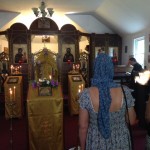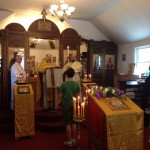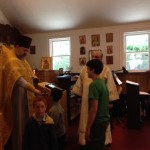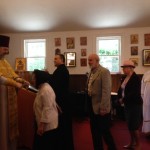On June 15, on the 1st Sunday after Pentecost dedicated to All Saints, St. George Church’s Rector, Archpriest Igor Tarasov served the Divine Liturgy. After the Gospel lesson he preached a homily:
“The Epistle lesson gives us today a good instruction on how to become a Saint. St. Paul mentions the glorious and heroic deeds of the Old Testament Saints and then he says to his listeners, “Therefore we also, since we are surrounded by so great a cloud of witnesses, let us lay aside every weight, and the sin which so easily ensnares us, and let us run with endurance the race that is set before us, looking unto Jesus, the author and finisher of our faith” (Heb. 12, 1-2). St. Paul’s instruction has three parts. Let us talk about them today.”
“Life for St. Paul was a race to be run and a crown to be won. Those who win such a race become crowned with holiness, become invited to the Kingdom of God. In order to win that race you need to free yourself from any unnecessary burden and obstacles. This is why the first part of St. Paul’s advice on how to become a Saint is to “lay aside every weight, and the sin which so easily ensnares us” (Heb. 2, 1). One of the known Orthodox preachers compared such weight to the small animals called barnacles. Barnacles are little crusty creatures that accumulate on the bottom of ships. They cause a great headache for shipowners. No bigger than walnuts, they can slow down a ship weighing thousands of tons. Within six months after it goes into the water, a vessel may acquire 2 or 3 inches of these barnacles. The layer can weigh 100 tons and reduce a ship’s speed by more than 10 percent. It increases consumption of fuel and it requires cleaning of the vessels every couple of years.”
“Like ships, we human beings can also accumulate barnacles that slow us down and burden us with unnecessary drag. They make our race for a crown of holiness much harder to win. What kind of barnacles we collect? St. Paul gives us a whole list of barnacles in his Epistle to the Galatians and calls them “the works of flesh”: “adultery, fornication, uncleanness, lewdness, idolatry, sorcery, hatred, contentions, jealousies, outbursts of wrath, selfish ambitions, heresies, envy, murders, drunkenness, revelries, and the like”. And he warns that those who practice such things will not inherit the Kingdom of God (Gal. 5, 19-21).”
“How do we remove the weight of sin, the annoying barnacles that accumulate in our lives? As it is not an easy task with ships, so it is not an easy task for us. St. Paul teaches us to crucify our flesh with its passions and desires. Kill your sinfulness. Our Lord Jesus Christ compares it to the severance of the members that cause us to sin. He says, “If your right eye causes you to sin, pluck it out and cast it from you; for it is more profitable for you that your members perish, than for your whole body to be cast into hell” (Mt. 5, 29). The same advice the Lord is giving about a hand (Mt. 5, 30). Jesus, of course, is not speaking literally here. He does not want us to start dismembering our bodies. But He is using strong language to stress the necessity of removing anything that hinders us, weighs us down, and impedes us in running the race and winning the prize.”
“By far the best way to keep our lives free of the weight of sin is by coming to Jesus daily and letting Him scrape us clean of every weight and sin through heartfelt repentance and honest confession. He alone can make us clean. He alone can present justified before God.”
“The second part of the instruction is “to run with endurance the race that is set before us” (Heb. 12, 1). We understand that that race is our life which needs to be spent in serving God and other people. To complete this task we need endurance. Again, the example of Jesus Christ can help us. St. Paul reminds that our Lord “for joy that was set before Him endured the cross” (Heb. 12, 2). We are also called to endure our own crosses for the joy set before us, the joy of heavenly blessedness.”
“And finally, the third part of the instruction is to look unto Jesus (Heb. 12, 2). As we run the race of life we must keep Jesus in full view at all times, looking to Him, for He is the author and finisher of faith. He is the Creator and the Finisher of everything, Alpha and Omega. He is our God and our Savior. Therefore, dear brothers and sisters, let us run the race of our Christian life laying aside every weight and sin; let us run with endurance the race for holiness which is set before us; let us always keep our spiritual eyes on Jesus, the Author and Finisher of faith. If we will do so, our names will be written in heaven and we will join the Saints.”
After the Liturgy dismissal the Rector congratulated all men in the parish on the occasion of Father’s Day and wished them God’s blessings and assistance in their endeavor of being good fathers and raising children. Traditional “Mnogaya leta!” was sung. Fr. Igor also reminded that next week we begin St. Peter’s Fast dedicated to the works of the holy Apostles. The Rector called God’s blessings upon parishioners to assist them in undergoing the spiritual journey of the fast.
Following the service parishioners and the Rector enjoyed delicious meals and a good company at the coffee hour.




